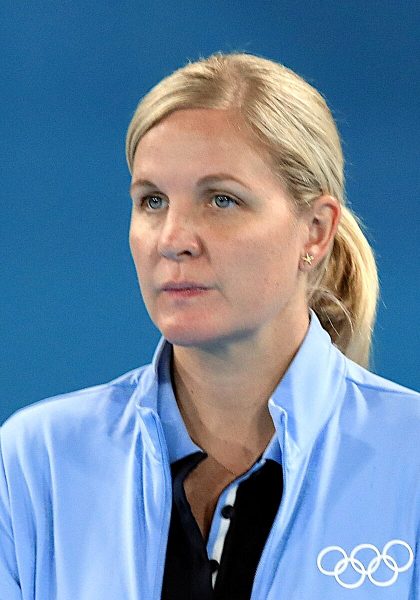Kirsty Coventry, a seven-time Olympic medalist in swimming from Zimbabwe, was elected March 20 as the 10th president of the International Olympic Committee (IOC). She will become the first woman to lead the organization in its 130-year history, following incumbent IOC president Thomas Bach’s impending retirement in June. Coventry’s election signals a hopeful new era of diversity for global sports leadership.
Coventry, 41, is now the youngest IOC president since its co-founder, Baron Pierre de Coubertin, helped lead the organization between 1896 and 1925. As the only woman in the pool of seven candidates, Coventry brings her own history with the Olympic Games. Coventry holds seven of her country’s eight medals in swimming, including four silvers, one bronze and two golds in the 200-meter backstroke in the 2004 Athens Games and the 2008 Beijing Games.
Her election comes at a pivotal moment for the Olympic movement, which faces growing pressure to address IOC issues, ranging from gender equality and inclusion in sport to environmental accountability and the politicization of global events. With climate concerns escalating, host cities and the IOC are under increased scrutiny to prove that hosting the Olympics can be both sustainable and economically practical.

Coventry’s new role blends diplomatic, financial and sports acumen. She will lead a committee that is responsible for bringing in billions of dollars and organizing the foremost international sporting event that is watched by millions around the world.
Committee members select the president via secret ballot at an IOC session, which took place in March of this year. IOC members include active athletes, former athletes and the presidents and senior leadership of each country’s International Sports Federation. To win the presidential election, a nominee must receive an absolute majority, or over 50% of the votes. There are multiple rounds of voting, with each round eliminating the candidate with the least amount of votes until one candidate secures an absolute majority. Presidents are elected to serve a term of eight years, with the potential to be renewed for an extra four years.
This time around, Coventry won decisively in the first round of voting, securing 49 of the 97 votes cast — clearing the majority threshold and leaving her closest challenger, Juan Antonio Samaranch Jr., well behind with only 28 votes. The swift result surprised many of the IOC’s voters, a group that features not only leaders of the sports world but also royals, business moguls and Hollywood stars.
The organization’s current leader, Thomas Bach, a former Olympic fencing champion, led the IOC through a turbulent 12-year presidency marked by unprecedented crises — from Russia’s state-sponsored doping scandal to mounting criticism over the enormous financial and other costs of hosting the games. Now, Coventry steps into the role with her own challenges: preparing for the Los Angeles Summer Olympics amid heightened global scrutiny of the United States and global leadership and environmental responsibility.
When asked about the prospect of working with President Donald Trump ahead of the 2028 Los Angeles Games, Coventry offered a measured response. Throughout her career, she remarked, she has had plenty of experience dealing with “difficult men in high positions.”
Coventry’s campaign platform emphasized realism and reform. She pledged to strengthen communication between IOC leadership and its broader membership — many of whom felt sidelined during Bach’s tenure — and to make the organization more transparent and athlete-focused. Her new vision frames the games as a way to bridge people and countries, creating a force for good.
Her message resonated in an election many saw as a mandate for change. Coventry’s victory was historic given who she is, but, more importantly, in respect to what she represents: a push for greater inclusion, equity and representation at the highest levels of leadership in sport.
Coventry said she was excited to be elected and she looks forward to the future.
“This is going to be etched in my memory for a long time. I am incredibly humbled to be here,” Coventry told IOC members after the vote. “I think as a nine-year-old girl, I did not think I’d ever be standing here getting the opportunity to give back to this movement and to work with all of you to make sure that other nine-year-olds realize their dreams.”
As the games face an immediate future shaped by political tension, cultural debate and environmental pressure, Coventry’s new presidency will begin June 24, with both symbolic weight and tangible responsibility. Her win marks a break from the past — and increasing pressure to turn a historic first into a lasting transformation.